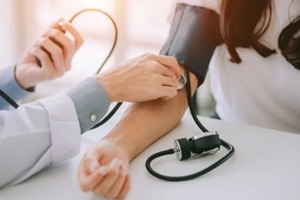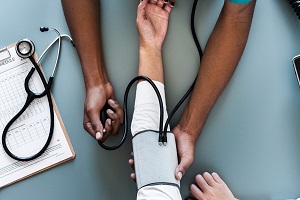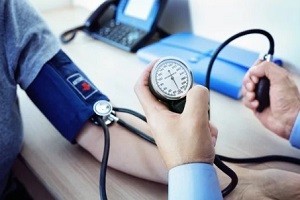 High blood pressure, or hypertension, affects more than 100 million adults in the U.S. Knowing your blood pressure numbers and ranges and understanding what they mean is key to preserving your health and reducing risks.
High blood pressure, or hypertension, affects more than 100 million adults in the U.S. Knowing your blood pressure numbers and ranges and understanding what they mean is key to preserving your health and reducing risks.
When checking blood pressure, the reading shows two numbers representing the force of blood flow against the walls of your arteries as your heart contracts and rests. The first measurement represents systolic pressure, measuring blood force when the heart beats.
The second is diastolic pressure, measuring blood force between heartbeats, in other words, when the heart is not beating and is relaxed. Normal blood pressure is under 120/80 mmHg. Higher ranges signify prehypertension or hypertension requiring medical care.
Normal Blood Pressure Range
Normal blood pressure is considered anything under 120 mmHg systolic and below 80 mmHg diastolic, or 120/80 mmHg. Maintaining numbers in this range can be achieved through heart-healthy lifestyle choices such as exercising regularly, eating nutritious whole foods low in sodium, reaching a healthy weight, avoiding smoking, limiting alcohol, and managing stress.
Prehypertension
Prehypertension occurs when systolic blood pressure is between 120 and 129 mmHg, while your diastolic is under 80 mmHg. These elevated levels mean you don’t have hypertension yet. Still, you will likely develop hypertension if you don’t take preventive steps through lifestyle improvements.
The good news is you can take charge by losing excess weight if overweight, quitting smoking, decreasing alcohol, reducing dietary sodium to under 1500 mg daily, getting more physical activity, and managing stress. These positive changes can help normalize your blood pressure.
Making heart-healthy modifications now provides the best chance to avoid progression to full hypertension down the road. Recognizing prehypertension early and taking action puts you in control.
High Blood Pressure Stage 1
 When blood pressure is consistently 130-139/80-89 mmHg, you have stage 1 hypertension. At this level, your doctor will likely recommend lifestyle changes. They may also consider adding blood pressure medication, depending on your risk of heart attack, stroke, or other cardiovascular issues.
When blood pressure is consistently 130-139/80-89 mmHg, you have stage 1 hypertension. At this level, your doctor will likely recommend lifestyle changes. They may also consider adding blood pressure medication, depending on your risk of heart attack, stroke, or other cardiovascular issues.
Lifestyle changes to focus on include achieving or maintaining a healthy weight through diet and exercise, limiting sodium intake, quitting smoking, restricting alcohol, managing stress, and getting regular physical activity. These steps help lower blood pressure and reduce associated health complications.
Your physician may also prescribe medication such as a diuretic, ACE inhibitor, ARB, calcium channel blocker, or beta blocker. Finding the medication or combination that optimally reduces your blood pressure is important. Closely follow your treatment plan.
High Blood Pressure Stage 2
At stage 2, your blood pressure readings hit 140/90 mmHg or higher. This substantially increases the risk of heart disease, stroke, kidney failure, cognitive decline, vision issues, and other health problems. Prompt medical treatment is essential in stage 2, high blood pressure.
Along with lifestyle adjustments, your doctor will likely prescribe a combination of medications since dual therapy is often more effective at lowering blood pressure than single medication.
Common pairings include a diuretic with an ACE inhibitor or ARB, a calcium channel blocker with an ACE inhibitor or ARB, or other combinations tailored to your needs. You must closely follow your prescribed regimen to lower your blood pressure and reduce the associated risks.
Getting high blood pressure under control is essential for protecting your health and avoiding complications such as heart attack, stroke, dementia, kidney disease, vision loss, and more. Make managing hypertension a priority by adhering to your doctor’s individualized recommendations.
Hypertensive Crisis
A hypertensive crisis occurs when blood pressure suddenly spikes over 180/120 mmHg. This emergency requires immediate treatment to prevent potential organ damage and other health threats. Signs can include severe headache, shortness of breath, nosebleeds, chest pain, numbness, vision changes, or speech difficulty.
Don’t wait and see if your blood pressure self-corrects. If you get a reading over 180/120 mmHg, retest after 5 minutes of quiet rest. If still extremely elevated, call 911 or emergency services promptly.
A crisis demands urgent medical care to reduce blood pressure quickly and prevent permanent injury.
Hospitalization may be required for intravenous medication to swiftly lower blood pressure while carefully monitoring for complications. Prompt emergency care for a hypertensive crisis is essential to avoid end-organ damage and preserve health.
Ongoing Blood Pressure Monitoring
Since hypertension rarely causes noticeable symptoms, you need regular blood pressure checks for early detection and timely treatment. Testing frequency depends on your numbers and risk profile.
For normal blood pressure, recheck at least every 2 years. For prehypertension, test yearly. Stage 1 hypertension requires testing every 3-6 months typically, while stage 2 high blood pressure needs checks every 1-3 months usually.
 If you are considered high-risk, you may need more frequent monitoring.
If you are considered high-risk, you may need more frequent monitoring.
Home blood pressure monitoring between office visits provides helpful additional data and can improve hypertension control. Use a clinically validated home monitor for accuracy.
Manage High Blood Pressure Effectively with Assistance from Imperial Center Family Medicine
Knowing your blood pressure numbers and ranges empowers you to take control of your health. While lifestyle plays a key role, treating elevated levels is necessary for reducing the risk of cardiovascular disease, stroke, kidney failure, cognitive decline, and other complications.
Don’t wait until you have extremely high readings or a hypertensive crisis before taking action. Schedule regular blood pressure checks and carefully follow your doctor’s treatment recommendations for any prehypertension or hypertension detected.
Imperial Center Family Medicine’s compassionate healthcare providers have extensive experience diagnosing and treating high blood pressure. We work with you to create a customized treatment plan to optimize your blood pressure.
Contact us today at 919-873-4437 or online to schedule an appointment, and together, we’ll ensure your blood pressure stays at healthy levels.
